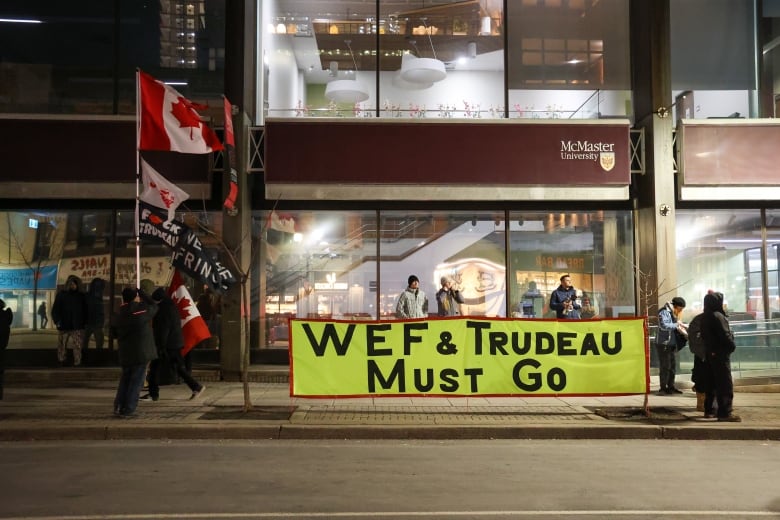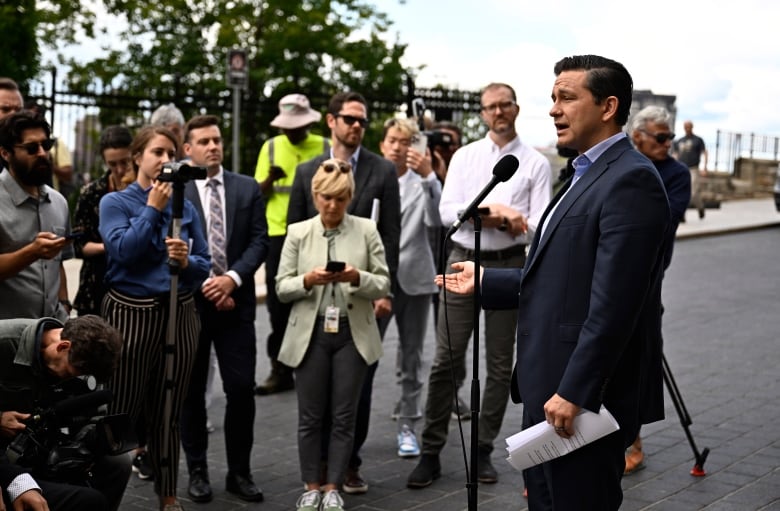Poilievre’s Conservative Party embracing language of mainstream conspiracy theories
Conservative Leader Pierre Poilievre has been hitting the summer barbecue circuit with ramped-up rhetoric around debunked claims that the World Economic Forum is attempting to impose its agenda on sovereign governments.
It is, some experts suggest, another sign that some conspiracy theories are moving from the fringes of the internet to mainstream thinking, as people’s distrust of government grows.
In speeches to Conservative supporters across Canada, Poilievre has promised that none of his ministers will attend the international organization’s conferences, including the annual meeting typically held in Davos, Switzerland.
“It’s far past time we rejected the globalist Davos elites and bring home the common sense of the common people,” said a Saturday fundraising email.
The Conservative Party also recently sent out mailers with a poll asking people to tell Prime Minister Justin Trudeau who they think the prime minister should stand with: working Canadians or the World Economic Forum.
The wording implies Trudeau’s cabinet is beholden to the latter.
Poilievre did not agree to an interview on the matter. His spokesperson instead pointed The Canadian Press to a clip of him at a rally in Penticton, B.C., in July, expressing concerns over the government invading people’s personal privacy and financial decisions.
“There will be no mandatory digital ID in this country, and I will ban all of my ministers and top government officials from any involvement in the World Economic Forum,” Poilievre said, chuckling as he received lengthy applause for the remark.

Ottawa’s history with the WEF
Canada has long participated in WEF events. Former Conservative prime minister Stephen Harper and his cabinet ministers attended the summit regularly. Trudeau attended in person in 2016 and 2018, and his ministers have attended as well. Liberal Finance Minister Chrystia Freeland went to the most recent annual summit in January.
On digital IDs, the federal government has been looking at technology to create a national digital identification document to help people access government services. It has not been promoted as something that will become mandatory.
Last winter, a conspiracy theory circulating on social media suggested Trudeau was going to require provinces to sign on to digital ID systems for their residents in order to get billions in new health-care funding. That conspiracy was also debunked.
The Conservative Party of Canada is reintroducing leader Pierre Poilievre to Canadians with a $3 million ad campaign that some insiders say is a move to rebrand him with a softer image.
Duane Bratt, a political science professor at Mount Royal University in Calgary, said some people have long embraced conspiracies, but now they have moved into mainstream politics.
“The big shift that we have seen is that it is now being promoted by someone who could be prime minister,” said Bratt.
Poilievre peddled the WEF control claims during the Conservative leadership race in 2022, and it has emerged again as a regular talking point following the federal byelection in southern Manitoba, said Bratt.

In that contest in Portage–Lisgar, the Conservatives were looking to beat back a growing challenge from the People’s Party of Canada. Maxime Bernier, the leader of that party who has long accused the WEF of having a globalist agenda, ran in the byelection.
The Conservatives attacked him for having attended the Davos summit when he was Harper’s foreign affairs minister in 2008.
Bratt said Poilievre’s embrace of conspiracy theories could be because he’s attempting to steal back votes from the PPC.
“The question is does he really believe it or is he just pandering to people, and will he pivot again if he becomes prime minister,” Bratt said.
Pandemic as a trigger
Kawser Ahmed, a politics professor at the University of Winnipeg with a research specialty in conspiracy theories, said the number and uptake of conspiracy theories began to grow after the 2016 presidential election in the United States, aided by social media and encrypted messaging apps.
But Ahmed said the biggest trigger was the COVID-19 pandemic.
“At that time, whatever decisions government took, it was explained to some corner of our citizens — in line with conspiracy theories — that the government is controlling you, the government has asked to give you a vaccine, the government has asked not to go out and so forth,” said Ahmed.
Front Burner26:11Why conspiracies surround the World Economic Forum
The World Economic Forum, and its annual summit for the rich and powerful in Davos, Switzerland, have long been targeted by criticism from the left. But since the start of the pandemic, the forum has become a huge concern for many people on the right, including those who view the WEF as shadowy puppet masters at the centre of a complex web of conspiracy theories. Today, journalist Justin Ling — host of the CBC podcasts The Flame Throwers and The Village — joins us to unpack many of those conspiracy theories, and examine the potential consequences of mainstream Canadian politicians amplifying suspicions about the organization.
It’s a sentiment politicians have learned to pick up on, and Bratt believes that many people aren’t willing to reject a politician just because they peddle false claims or conspiracies.
“There’s a lot of ideas that are now moving into the mainstream that are simply not supported by science, evidence or facts,” he said. “But it doesn’t matter and some of those politicians have been elected, like the current premier of Alberta.”
United Conservative Party Premier Danielle Smith has said she is in lockstep with Poilievre, and will having nothing to do with the World Economic Forum.
Populism has driven politicians to feed into conspiracy theories because they need votes, and fear is a great motivator, said Ahmed. They get less interest peddling for votes using their record.
“It’s very easy to appeal to people that something is a threat,” he said. “For example, your identity, your livelihood, your religious values.”
Ahmed said it is affecting our democracy, pitting groups against each other, creating suspicion and harming national security by spreading misinformation that eventually affects policy.


